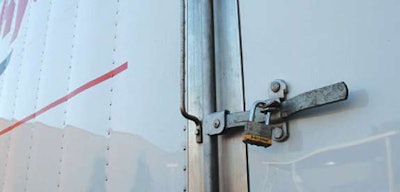
As the celebration of the nation's founding looms, so do the prospects of the load on your truck -- or some part of it -- will be the target of thieves.
The Sensitech Supply Chain Intelligence Center says holiday weekends are of notoriously high risk for manufacturers and logistics-related organizations. It adds that organized cargo theft rings in the United States and Canada will be extremely active in the coming days, as more shipments are left unattended for extended periods of time due to the upcoming holiday.
Sensitech warns this year July 4th falls on a Sunday, meaning that many facilities may be closed on Friday, July 2, and/or Monday, July 5, resulting in longer stage times and lower security staffing. On July 4 holidays between 2016 and 2020, Sensitech recorded 2.7 thefts per day, which is 13% higher than thefts throughout the year.
The company also said:
- Texas (+63%), Florida (+75%), and Ontario (+100%) had significantly higher theft rates during the holiday weekend than throughout the year
- Theft of full truckload (+11%) and facility theft (+33%) were both more frequently perpetrated over the holiday weekend
- Alcohol (+33%), building and industrial(+25%), food and drinks (+13%), home and garden (+87%), and metals (+140%) each recorded higher theft rates when compared to the rest of the year
Sensitech recommends companies and their drivers ensure security protocols are up-to-date and in line with industry best practices for both in-transit and warehouse operations. In order to mitigate criminal attempts to exploit cargo at rest, the company suggests confirming that a given receiver’s hours of operation for the holiday weekend are consistent with scheduled delivery times and planning for secure parking locations in the event a shipment will have to stop for an extended period of time.
RELATED NEWS: Trucker arrested in connection with theft of 21 tons of pistachios
RELATED NEWS: July 4th travel expected to set new record; 43.6 million to hit the highway
Covert GPS tracking and active monitoring of high-value shipments are highly recommended, as they have proven to be the most effective protocols to both mitigate in-transit theft and facilitate successful recovery of stolen products, according to Sensitech.
The security company also suggests:
- Steps should be taken to verify the authenticity of all shipment-related activity during these periods – particularly any entity engaged to either move or store a shipment. Driver and business verification, prior to releasing any shipment, is paramount.
- Communication between drivers and shippers needs to be firmly established and regularly maintained during shipments over these periods. That communication should include driver(s) instruction as to what types of behavior are required and what is not permissible.
- Truck stops, highway rest areas and distribution centers are frequent targets for cargo thieves - not only traditionally but more so over holiday periods. For that reason, any location where cargo would either intentionally (or unintentionally) come to rest - even for brief periods of time - should be as secure as possible. Things to consider when selecting a secure area/lot are: controlled access, adequate lighting, congestion, any type of either personal or video surveillance, how long the conveyance will be left unattended, as well as past intelligence of localized cargo theft activity.
- If a cargo conveyance must be left unattended for any period of time it should be made as secure as possible. Theft-resistant locking/sealing mechanisms for tractors, trailers and cargo compartments; disabling technology for the vehicle’s power units or trailer movements; parking vehicles and/or cargo compartments in a fashion which make access as difficult as possible – are all things worthy of strong consideration.
- If any tracking technology, such as GPS monitoring, that is available for deployment should be used to its fullest extent possible. That would include tracking technology on the conveyance’s power unit, its cargo area (if separate), as well as within the cargo itself.
- Make sure all lists of company individuals responsible for contact, in the event of suspicious activity or emergency, are up to date. All entities that monitor your alarm/access activity need to have access to these up-to-date lists.
- Encourage local law enforcement agencies to make extra patrols in the areas where your facilities are located – as well as make it as easy as possible for them to “see” your critical access areas.









